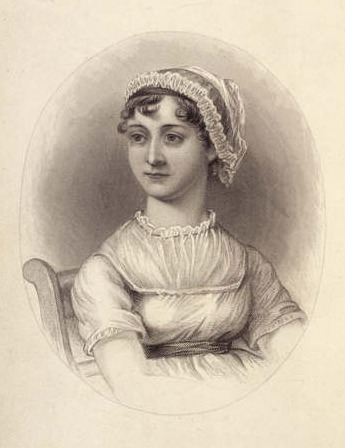
I was wandering around a bookstore yesterday when I saw yet another novel based on Jane Austen's books. Since the BBC's "Pride & Prejudice" a whole industry has been created to sell all things Jane. There are mystery novels featuring Jane as a crime solver, etiquette and dating guides based on Jane's writing, and "sequels" and "prequels" to her famous novels. There are updated versions and erotic versions of her stories. Now there are even books based on women obsessed by Jane's writing, such as Me and Mr. Darcy and Austenland.
My first exposure to Jane Austen was not auspicious. I was just 18 and didn't know a thing about her or her writing. When I ran into one of my English professors on the Quad, I grumbled about being assigned one of her novels in another course. He immediately dragged me to the main library and made me take out an neat little edition of Jane's Juvenalia. I read a few of her early stories and I realized, "Ah, she's so funny and silly. Why didn't anyone tell me?"
I went on to read all of her novels, some many times. My favorite is probably the mature Persuasion, although I have an inordinate fondness for Mansfield Park. The heroines of these two novels are not the prettiest girls in the room, nor are they the richest. They are ethical, intelligent and kind young women who have very little power over their lives and cannot control the foolishness around them. Anne Elliot and Fanny Price are always treated as outsiders, even within their own families; watching from outside is essential to Jane's narratives. As a kid from Richmond attending Stanford, I knew what it was to feel like an outsider, and I empathized with her characters.
The outsider's perspective was essential to Jane's humor. She saw the absurdity in life and, yes, in romance. I do not deny that many of the tributes to Jane are loving and well-researched. My novels pay homage to Jane and her comedies of manners. But a few of the books and many modern readers seem to focus inordinately on Jane's romantic love plots and the vision of Colin Firth in wet clothes. Now, I am as fond of Colin Firth in wet clothes as anyone, but Jane's observations on social class, morality, financial security, and kindness should not be ignored. Compassion is as important to her stories as romance.
Most of the recent film treatments dumb down and glam up her stories. Healthy, gorgeous, modernized heroines run around barefoot and ride bareback. Noblewomen inexplicably barge into homes in the middle of the night. Secondary characters, essential to revealing the nature of her main characters, are often diminished or eliminated. The humor is largely missing.
Now a new movie is out about Jane. "Becoming Jane" stars the radiantly beautiful, talented Anne Hathaway as the pleasant-looking Jane. The script is fashioned after Jane's novels and the tag line for the movie is, "Their love story was her greatest inspiration." Yes, this for an author who was diligently writing at the age of 12. The filmmakers do not trust that the story of a plain Jane spinster who wrote beautiful, elegant, witty, and kind stories is enough to enthrall audiences. No, they have remade her in the conventions of a modern heroine.
A pity, since some of us believe she was amazing and wonderful just as she was.
I'll be reading at Book Passage-Corte Madera this Tuesday, August 7, 7:00 p.m. I am very easy to divert onto a discussion of why Jane Austen is still fabulous.
No comments:
Post a Comment